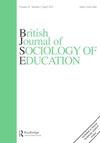“他们认为残疾/精神疾病是一种潮流”:精英教育中的残疾、资本和欲望
IF 2.1
3区 教育学
Q1 EDUCATION & EDUCATIONAL RESEARCH
引用次数: 0
摘要
摘要研究长期以来一直证明残疾青年在教育中所经历的排斥和排斥。本文介绍了在英国一所“精英”六年级学院进行的一项民族志研究的结果,该研究的背景是不断变化的社会、政治和文化景观,以心理健康和幸福为中心的关于残疾和健康主义的新自由主义话语正进一步嵌入教育政策中。根据布迪厄和福柯的理论工作,我们展示了本研究中的学生如何能够将残疾重新作为一种自由的知识身份标记,并将其作为有限的大学子领域中的一种资本形式。然而,我们认为,这些被赋予权力的残疾人主体性是强烈的中产阶级和不稳定的。这些发现通过推进当前对年轻人在教育中与残疾的复杂关系、围绕残疾的持久不平等以及社会阶层如何与之相关的理解而产生了影响。本文章由计算机程序翻译,如有差异,请以英文原文为准。
‘They think it’s trendy to have a disability/mental-illness’: disability, capital and desire in elite education
Abstract Research has long demonstrated the exclusion and Othering experienced by young people with disabilities in education. This paper presents findings from an ethnographic study conducted in an ‘elite’ sixth-form college in England, set against the backdrop of a shifting social, political, and cultural landscape, where neo-liberal discourses of dis/ability and healthism—centring on mental health and wellbeing—are becoming further embedded in educational policy. Drawing on theoretical work by Bourdieu and Foucault, we demonstrate how the students in this study appeared able to re-make disability as a liberal intellectual identity marker and use it as a form of capital within the bounded college sub-field. However, we argue that these empowered disabled subjectivities were strongly middle-classed and precarious. The findings have implications through advancing current understandings of young people’s complexifying relationships with disability in education, of enduring inequalities around disability, and how social class is implicated in this.
求助全文
通过发布文献求助,成功后即可免费获取论文全文。
去求助
来源期刊
CiteScore
3.70
自引率
9.50%
发文量
74
期刊介绍:
British Journal of Sociology of Education is one of the most renowned international scholarly journals in the field. The journal publishes high quality original, theoretically informed analyses of the relationship between education and society, and has an outstanding record of addressing major global debates about the social significance and impact of educational policy, provision, processes and practice in many countries around the world. The journal engages with a diverse range of contemporary and emergent social theories along with a wide range of methodological approaches. Articles investigate the discursive politics of education, social stratification and mobility, the social dimensions of all aspects of pedagogy and the curriculum, and the experiences of all those involved, from the most privileged to the most disadvantaged. The vitality of the journal is sustained by its commitment to offer independent, critical evaluations of the ways in which education interfaces with local, national, regional and global developments, contexts and agendas in all phases of formal and informal education. Contributions are expected to take into account the wide international readership of British Journal of Sociology of Education, and exhibit knowledge of previously published articles in the field. Submissions should be well located within sociological theory, and should not only be rigorous and reflexive methodologically, but also offer original insights to educational problems and or perspectives.

 求助内容:
求助内容: 应助结果提醒方式:
应助结果提醒方式:


